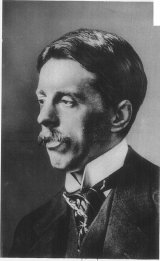Paris Nights and Other Impressions of Places and People Page #3
Enoch Arnold Bennett (27 May 1867 - 27 March 1931) was an English writer. He is best known as a novelist, but he also worked in other fields such as the theatre, journalism, propaganda and films. Bennett was born in a modest house in Hanley in the Potteries district of Staffordshire. Hanley was one of the Six Towns that were joined together at the beginning of the 20th century as Stoke-on-Trent and are depicted as "the Five Towns" in some of Bennett's novels. Enoch Bennett, his father, qualified as a solicitor in 1876, and the family moved to a larger house between Hanley and Burslem.
- Year:
- 1913
- 108,195 Views
This was a tall, large-boned, ugly, coquettish woman, with a strong physical attractiveness and a voice that caused vibrations in your soul. She was in white, with a powerful leather waistband which suited her. She was intimate with everybody except me, and by a natural gift and force she held the attention of everybody from the moment of her entrance. You could see she was used to that. The time was a quarter to midnight, and she explained that she had been trying to arrive for hours, but could not have succeeded a second sooner. She said she must recount her journée, and she recounted her journée, which, after being a vague prehistoric nebulosity up to midday seemed to begin to take a definite shape about that hour. It was the journée of a Parisienne who is also an amateur actress and a dog-fancier. And undoubtedly all her days were the same: battles waged against clocks and destiny. She had no sense of order or of time. She had no exact knowledge of anything; she had no purpose in life; she was perfectly futile and useless. But she was acquainted with the secret nature of men and women; she could judge them shrewdly; she was the very opposite of the ingénue; and by her physical attractiveness, and that deep, thrilling voice, and her distinction of gesture and tone, she created in you the illusion that she was a capable and efficient woman, absorbed in the most important ends. She sat down negligently behind the host, waving away all ice and Asti, and busily fanning both him and herself. She flattered him by laying her ringed and fluffy arm along the back of his chair. “Do you know,” she said, smiling at him mysteriously. “I have made a strange discovery to-day. Paris gives more towards the saving of lost dogs than towards the saving of lost women. Very curious, is it not?” The host seemed to be thunderstruck by this piece of information. The whole table was agitated by it, and a tremendous discussion was set on foot. I then witnessed for the first time the spectacle of a fairly large mixed company talking freely about scabrous facts. Then for the first time was I eased from the strain of pretending in a mixed company that things are not what they in fact are. To listen to those women, and to watch them listening, was as staggering as it would have been to see them pick up red-hot irons in their feverish, delicate hands. Their admission that they knew everything, that no corner of existence was dark enough to frighten them into speechlessness, was the chief of their charms, then. It intensified their acute femininity. And while they were thus gravely talking, ironical, sympathetic, amused, or indignant, they even yet had the air of secretly thinking about something else. Discussions of such subjects never formally end, for the talkers never tire of them. This subject was discussed in knots all the way down six flights of stairs by the light of tapers and matches. I left the last, because I wanted to get some general information from my host about one of his guests. “She is divorcing her husband,” he said, with the simple sad pride of a man who had been a petitioner in the matrimonial courts. “For the rest, you never meet any but divorced women at my place. It saves complications. So have no fear.” We shook hands warmly. “Au revoir, mon ami.” “Au revoir, mon cher.” II--THE VARIÉTIÉS The filth and the paltry shabbiness of the entrance to the theatre amounted to cynicism. Instead of uplifting by a foretaste of light and magnificence, as the entrance to a theatre should, it depressed by its neglected squalour. Twenty years earlier it might have cried urgently for cleansing and redecoration, but now it was long past crying. It had become vile. In the centre at the back sat a row of three or four officials in evening dress, prosperous clubmen with glittering rakish hats, at a distance of twenty feet, but changing as we approached them to indigent, fustian-clad ticket-clerks penned in a rickety rostrum and condemned like sandwich-men to be ridiculous in order to live. (Their appearance recalled to my mind the fact that a “front-of-the-house” inspector at the principal music-hall in France and in Europe is paid thirty sous a night.) They regarded our tickets with gestures of scorn, weariness, and cupidity. None knew better than they that these coloured scraps represented a large lovely gold coin, rare and yet plentiful, reassuring and yet transient, the price of coals, boots, nectar, and love. We came to a very narrow, low, foul, semi-circular tunnel which was occupied by hags and harpies with pink bows in their hair, and by marauding men, and by hats and cloaks and overcoats, and by a double odour of dirt and disinfectants. Along the convex side of the tunnel were a number of little doors like the doors of cells. We bought a programme from a man, yielded our wraps to two harpies, and were led away by another man. All these beings looked hungrily apprehensive, like dogs nosing along a gutter. The auditorium which was nearly full, had the same characteristics as the porch and the couloir. It was filthy, fetid, uncomfortable, and dangerous. It had the carpets of a lodging-house of the ‘seventies, the seats of an old omnibus, the gilt and the decorated sculpture of a circus at a fair. And it was dingy! It was encrusted with dinginess! Something seemed to be afoot on the stage: from the embittered resignation of the audience and the perfunctory nonchalance of the players, we knew that this could only be the curtain-raiser. The hour was ten minutes past nine. The principal piece was advertised to commence at nine o’clock. But the curtain-raiser was not yet finished, and after it was finished there would be the entr’acte--one of the renowned, interminable entr’actes of the Théâtre des Variétés. ***** The Variétés is still one of the most “truly Parisian” of theatres, and has been so since long before Zola described it fully in Nana. The young bloods of Buenos Ayres and St. Petersburg still have visions of an evening at the Variétés as the superlative of intense living. Every theatre with a reputation has its “note,” and the note of the Variétés is to make a fool of its public. Its attitude to the public is that of an English provincial hotel or an English bank: “Come, and he d----d to you! Above all, do not imagine that I exist for your convenience. You exist for mine.” At the Variétés had management is good management; slackness is a virtuous coquetterie. It would never do, there, to be prompt, clean, or honest. To make the theatre passably habitable would be ruin. Its chic would be lost if it ceased to be a Hades of discomfort and a menace to health. There is a small troupe of notorious artistes, some of whom show great talent when it occurs to them to show it; the vogue of the rest is one of the innumerable mysteries which abound in theatrical life. It is axiomatic that they are all witty, and that whatever lines they enunciate thereby become witty. They are simply side-splitting as Sydney Smith was simply side-splitting when he asked for the potatoes to be passed. Also the manager of the theatre always wears an old straw hat, summer and winter. He is the wearer of an eternal battered straw hat, who incidentally manages a theatre. You go along the boulevard, and you happen to see that straw hat emerging from the theatre. And by the strange potency of the hat you will be obliged to say to the next acquaintance you meet: “I’ve just seen Samuel in his straw hat.” And the thought in your mind and in the mind of your acquaintance will be that you are getting very near the heart of Paris.
Translation
Translate and read this book in other languages:
Select another language:
- - Select -
- 简体中文 (Chinese - Simplified)
- 繁體中文 (Chinese - Traditional)
- Español (Spanish)
- Esperanto (Esperanto)
- 日本語 (Japanese)
- Português (Portuguese)
- Deutsch (German)
- العربية (Arabic)
- Français (French)
- Русский (Russian)
- ಕನ್ನಡ (Kannada)
- 한국어 (Korean)
- עברית (Hebrew)
- Gaeilge (Irish)
- Українська (Ukrainian)
- اردو (Urdu)
- Magyar (Hungarian)
- मानक हिन्दी (Hindi)
- Indonesia (Indonesian)
- Italiano (Italian)
- தமிழ் (Tamil)
- Türkçe (Turkish)
- తెలుగు (Telugu)
- ภาษาไทย (Thai)
- Tiếng Việt (Vietnamese)
- Čeština (Czech)
- Polski (Polish)
- Bahasa Indonesia (Indonesian)
- Românește (Romanian)
- Nederlands (Dutch)
- Ελληνικά (Greek)
- Latinum (Latin)
- Svenska (Swedish)
- Dansk (Danish)
- Suomi (Finnish)
- فارسی (Persian)
- ייִדיש (Yiddish)
- հայերեն (Armenian)
- Norsk (Norwegian)
- English (English)
Citation
Use the citation below to add this book to your bibliography:
Style:MLAChicagoAPA
"Paris Nights and Other Impressions of Places and People Books." Literature.com. STANDS4 LLC, 2025. Web. 10 Mar. 2025. <https://www.literature.com/book/paris_nights_and_other_impressions_of_places_and_people_110>.








Discuss this Paris Nights and Other Impressions of Places and People book with the community:
Report Comment
We're doing our best to make sure our content is useful, accurate and safe.
If by any chance you spot an inappropriate comment while navigating through our website please use this form to let us know, and we'll take care of it shortly.
Attachment
You need to be logged in to favorite.
Log In